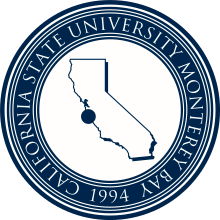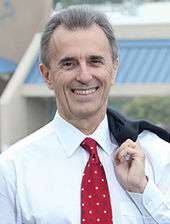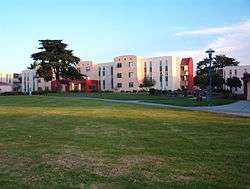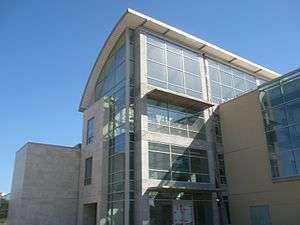California State University, Monterey Bay
 | |
| Type | Public |
|---|---|
| Established | 1994 |
| Endowment | $22.8 million (2017)[1] |
| President | Eduardo M. Ochoa |
Academic staff | 510 (Fall 2016)[2] |
| Students | 7,274 (Fall 2016)[3] |
| Undergraduates | 6,755 (Fall 2016)[3] |
| Postgraduates | 519 (Fall 2016)[3] |
| Location |
Marina and Seaside, Monterey County, California, U.S. 36°39′12″N 121°47′47″W / 36.6533888889°N 121.796416667°WCoordinates: 36°39′12″N 121°47′47″W / 36.6533888889°N 121.796416667°W |
| Campus | 1,350 acres (5% of the former Fort Ord)[4] |
| Colors |
Bay blue, valley green and golden sand[5] |
| Athletics | NCAA Division II – CCAA |
| Nickname | Otters |
| Affiliations |
California State University system AASCU |
| Mascot | Monte Rey Otter |
| Website |
www |
 | |
California State University, Monterey Bay (CSUMB) is a public university in the 23-campus California State University system, located in Marina and Seaside, in Monterey County, California. It is on the site of the former U.S. Army base Fort Ord in the northern Central Coast of California region and is accredited by the Western Association of Schools and Colleges.
History
CSUMB was founded in 1994 with a student enrollment of 654 students. Classes began August 28, 1995. The founding president was Peter Plympton Smith. It was the 21st campus in the California State University System. The university offers 23 bachelor's degrees, 7 master's degrees, and teaching credentials.[6]
As of fall 2016, the university has 6,883 undergraduate students, 544 graduate students and 163 full-time faculty members.[7][2] The university operates on the semester system. The current president Eduardo M. Ochoa was appointed in May 2012.[8]
CSUMB, in conjunction with Hartnell College, developed CSin3, a 3-year computer science program funded in part by grants from the Foundation established by Matsui Nursery.[9] That Foundation also donated 210 acres of prime agricultural land to the Hartnell College Foundation, with a valuation of about $20 million.[10]
CSUMB presidential history

| Name | Commenced term | Ended term | |
|---|---|---|---|
| 1. | Peter Plympton Smith | 1994 | 2005 |
| 2. | Diane Cordero de Noriega (Interim) | 2005 | 2006 |
| 3. | Dianne F. Harrison | 2006 | 2012 |
| 4. | Eduardo M. Ochoa | 2012 | N/A |
Demographics
| Undergraduate | |
|---|---|
| African American | 6% |
| Asian American | 7% |
| Hispanic American | 39% |
| Pacific Islander | 1% |
| Native American | 1% |
| White American | 32% |
| Two or more | 8% |
| Ethnicity unreported/unknown | 6% |
Faculty
In the Fall of 2016, of 510 teaching faculty, 244 hold doctorates or another terminal degree, and 145 are members of minority groups.[2]"The faculty includes an American Book Award winner and six Fulbright scholars.[2]
Students
The student body is made up of 63% females and 37% males. As of fall 2016, 35% of students enrolled were under 21 years of age, 44% between 21 and 24, 14% between 25 and 30, 7% over the age of 31. The most common majors were business administration (13%), psychology (12%), biology (8%), kinesiology (9%), human communication (7%) and liberal studies (6%). More than one third of students came from Monterey, Santa Cruz, and San Benito counties (all California counties) while 58% came from other parts of California, 2% from other U.S. states and 3% from outside the U.S. Over a third (35%) of students were low-income and over half (57%) were first-generation college students. Students are distributed across class levels; 19% being freshmen, 12% sophomores, 26% juniors and 32% seniors as CSU Monterey Bay serves a large proportion of transfer students. Graduate students make up 7%, and 2% were seeking credentials.[7]
Research
Under a cooperative agreement with the NASA Ames Research Center, the university performs remote sensing, ecosystem modeling, and geospatial research for earth system science and health.[11] CSUMB researchers work in 10 areas, including coral reef monitoring, land use, carbon modeling and disease transmission.[12]
Student life

Approximately fifty percent of CSUMB students live on campus.[13]
Athletics
CSUMB's athletic mascot is the Otter. Its athletic teams compete in NCAA Division II, primarily in the California Collegiate Athletic Association (CCAA). The Otters field 12 sports for men and women for the fall, winter, and spring seasons. Fall sports for men include cross country and soccer. Fall sports for women include cross country, soccer, and volleyball. The winter sport for men and women is basketball. Spring sports for men include baseball and golf. Spring sports for women include golf, softball, and water polo.
Campus
The university's goal is to be carbon neutral by 2030, with a solar array, installed in 2010, currently meeting 16 percent of the university's needs.[14]
Additionally, the university's Dining Commons were awarded LEED Silver certification in 2011. The Dining Commons were designed to include water efficiency and natural and energy-efficient lighting.[15]
Residence Halls
CSUMB offers housing in many areas around campus. On the main campus there are eight residence halls each renovated Army barracks. Willet, Cypress, Manzanita, Asilomar, Yarrow, Avocet, Tortuga, and Sanderling Halls surround the main quad on campus. Pinnacles and Vineyard Suites as well as Strawberry Apartments make up North Quad on the north end of campus. In fall of 2015 the University opened three new residence halls, called Promontory, all of which offering apartment size dormitories.[16]
Tanimura & Antle Family Memorial Library

The Tanimura & Antle Family Memorial Library has 136,151 square feet (12,648.8 m2) of floor space.[17] It is located at Divarty and Fifth Street, and diagonally across from the Chapman Science Center. A roundabout sits between the library and the science building. The Tanimura & Antle Family Memorial Library is certified LEED Silver and has been cited for a range of sustainable design strategies from daylighting and low-energy use to healthy carpets, water conservation, and high-recycled content materials.[17]
Aside from being the largest building on the CSUMB campus, it is the greenest in terms of energy usage. Up to 30% less electricity is needed, for example, because of floor-to-ceiling glass walls that let in natural light. Additionally, ventilation techniques operate through the floor instead of the ceiling, allowing cooler air to travel a lesser distance. The light let in from the atrium is indirect rather than direct sunlight.
See also
- Universities and colleges in Monterey County, California
References
- ↑ As of June 30, 2017. "U.S. and Canadian Institutions Listed by Fiscal Year (FY) 2017 Endowment Market Value and Change in Endowment Market Value from FY 2016 to FY 2017" (PDF). National Association of College and University Business Officers and Commonfund Institute. 2017.
- 1 2 3 4 "Common Data Set 2016-2017, California State University, Monterey Bay" (PDF).
- 1 2 3 "Total Enrollment by Sex and Student Level, Fall 2016". The California State University. Retrieved March 11, 2017.
- ↑ "The California State University Capital Outlay Program 2013/2014; Five-Year Capital Improvement Program" (PDF). calstate.edu. Retrieved July 15, 2017.
- ↑ "Color Palette; California State University Monterey Bay". csumb.edu. Retrieved 2017-07-15.
- ↑ "About CSUMB". csumb.edu. Retrieved 2017-07-15.
- 1 2 3 "Enrollment Fast Facts (Headcounts) for Fall 2016" (PDF). csumb.edu.
- ↑ "President Ochoa's appointment made permanent". csumb.edu. Retrieved 2017-07-15.
- ↑ https://csin3.wordpress.com/
- ↑ http://www.montereyherald.com/article/NF/20171102/NEWS/171109957
- ↑ University Corporation at Monterey Bay NASA. nasa.gov (2011-08-29). Retrieved on 2017-07-15.
- ↑ Salinas, Claudia Meléndez (March 15, 2012). "CSUMB earns $32M NASA grant to aid study of irrigation, wildfires, crops, floods". The Monterey County Herald. Retrieved July 15, 2017.
- ↑ CSUMB Residential Housing Association. Retrieved 2017-07-15
- ↑ The Princeton Review's Guide to 322 Green Colleges
- ↑ "CSU Monterey Bay Dining Commons". sbibuilders.com. Retrieved 2014-08-18.
- ↑ Schmalz, David (April 30, 2015). "New student housing at CSUMB replaces blight, and makes a dent in school's housing shortage". Monterey County Weekly. Retrieved July 15, 2017.
- 1 2 "Tanimura and Antle Family Memorial Library". ehdd.com. Retrieved July 15, 2017.
External links
| Wikimedia Commons has media related to California State University, Monterey Bay. |